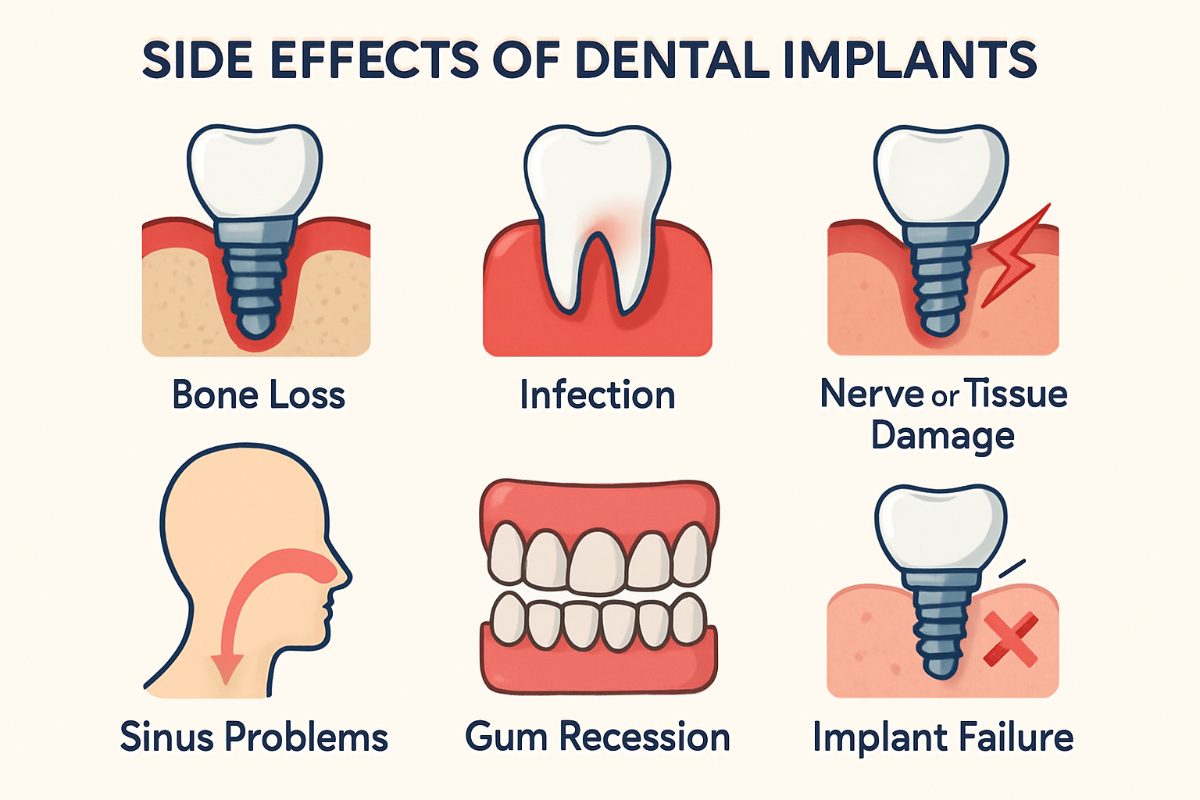Dental implants are a reliable way to replace missing teeth, but like any surgery they can cause side effects. This article explains common and rare side effects of dental implants, how often they happen, and simple steps to prevent them. You’ll get clear signs to watch for and practical tips before and after surgery — including how to reduce risks of side effects of dental implants in Port Orange, FL.
Common side effects of dental implants
Most patients have short-term, expected reactions after implant surgery. Pain, swelling, minor bleeding, and bruising are common and usually fade within a few days to two weeks. Knowing what’s normal helps you avoid unnecessary worry and call your team only when needed.
Early post-op symptoms
Mild to moderate pain is normal and is usually controlled with prescribed or over-the-counter pain meds. Swelling often peaks 48–72 hours after surgery and then improves. Minor bleeding or oozing for the first day is common; bright red heavy bleeding is not. If pain worsens after improving, that’s a warning sign.
Infection and delayed healing
Infections can cause increasing pain, swelling, redness, pus, or fever. Delayed healing may show as soreness that won’t subside or exposed threads of the implant. Infections matter because they can threaten bone support around the implant and lead to failure if not treated promptly.
Less common but serious issues
Rare problems include nerve injury (numbness or tingling in the lip, chin, or tongue), sinus complications for upper implants, and implant failure where the implant loosens. These are not common but need fast attention if symptoms appear.
Why these side effects of dental implants happen
Side effects usually stem from surgical trauma, bacterial contamination, poor bone quality, or medical factors that affect healing. Too much force on a new implant from a restoration can also cause problems.
Role of patient health and habits
Smoking, uncontrolled diabetes, poor oral hygiene, and certain medications slow healing and raise infection risk. Healthy habits and stable medical conditions lower the chance of side effects.
Role of planning and technique
Accurate planning and precise implant placement reduce complications. Poor imaging, wrong angulation, or an ill-fitting crown can cause pain, bone loss, or mechanical failure.
How to avoid side effects of dental implants
Take steps before, during, and after surgery to protect your implant and speed recovery.
Pre-op planning and testing
Advanced imaging, like CBCT scans and digital impressions, helps your team plan placement to avoid nerves and sinuses. A full medical and dental history flags risks so the plan can be adjusted.
Choosing the right provider and technique
Choose a team with implant, periodontal, and prosthetic experience. Precise placement and well-designed restorations lower chances of inflammation and mechanical problems.
Home care and recovery best practices
Follow instructions: rest, avoid smoking, eat soft foods, keep the area clean with gentle rinses, and take medications as prescribed. Good oral hygiene is key to preventing infection.
How White Wolf Dental Group helps reduce risks
White Wolf Dental Group in Port Orange uses on-site CBCT, digital scans, and an in‑house lab to improve planning and fit. Faster, more accurate restorations and coordinated care reduce many common side effects of dental implants in Port Orange, FL.
The clinical team
Drs. Kulaga, Abrahams, and Carota combine training in implants, periodontics, and prosthodontics to deliver coordinated care that lowers surgical and restorative risks.
When to call your dentist — warning signs
Call if you have uncontrolled pain, persistent or increasing swelling, heavy bleeding, fever, new numbness, foul discharge, or a loose implant or crown.
What the dentist will do
Your dentist will examine you, take imaging, start antibiotics if needed, perform minor interventions like cleaning the area, or refer you for advanced care.
Conclusion and next steps
Most side effects of dental implants are short‑lived and preventable with good planning and care. Talk with your implant team about risks, ask about imaging and lab capabilities, and schedule a consultation if you’re considering implants.


